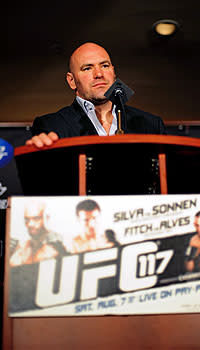Sonnen's failure shows PEDs still a problem
I have no idea of the actual percentage of mixed martial arts fighters who are using anabolic steroids. Dennis Hallman, an Ultimate Fighting Championship welterweight, estimated during an appearance on HDNet's "Inside MMA" in June that 50 percent "easy" of all fighters in the sport are using steroids. UFC president Dana White disputed Hallman's contention and suggested the real figure is far lower.
Hallman apologized for his words while still in the cage after a win over Ben Saunders at Oracle Arena in Oakland, Calif., on Aug. 7 in an undercard fight at UFC 117, undoubtedly after having received significant peer pressure to do so.
The industry-leading Ultimate Fighting Championship spends literally millions of dollars a year to try to prevent the steroid problem and hosts a mandatory annual fighter summit in Las Vegas in which Drug Enforcement Agency officials speak to the fighters about the ramification of performance enhancing drugs usage.
Yet, despite the UFC's attempts to educate and the various state athletic commissions' rigorous testing procedures, fighters continue to use, clearly because they believe the reward outweighs the risk.
On Saturday, Sherdog.com reported that UFC middleweight Chael Sonnen flunked a post-fight urinalysis after his loss to Anderson Silva in the middleweight title fight that was the main event of UFC 117.
George Dodd, executive officer of the California State Athletic Commission, told reporter Greg Savage that Sonnen received notice of the failed test on Friday. Dodd did not specify to Savage what substance was detected in Sonnen's urine, though he did say that all fighters tested on the card passed their tests for drugs of abuse.
Sonnen is the second prominent UFC fighter in the last month to be tied to steroids. An assistant U.S. attorney in Alabama mentioned heavyweight contender Shane Carwin's name as a recipient of steroids shipments during the Aug. 13 sentencing of a Mobile, Ala., pharmacist who was found guilty of participating in a nationwide conspiracy to distribute steroids.
It's a serious problem with no easy solution. If the California commission concludes that Sonnen did use a performance-enhancing drug prior to his fight with Silva, it will fine him and suspend him, likely for nine months to a year.
That will mean no lucrative championship rematch with Silva in January or February, which in and of itself will cost Sonnen hundreds of thousands of dollars. When you add in the fine and the loss of a fight, plus what likely will be a drop in endorsement income, it will probably wind up costing Sonnen in excess of $1 million.
White, who said he does not know the particulars of Sonnen's situation, was exasperated on Sunday. He wants to eradicate steroids from the sport, but is realistic enough to know how difficult it is and is compassionate enough that he doesn't want to bury someone further.
"What else do I do?" White said. "We've spent millions of dollars – literally, millions of dollars – to try to get this thing regulated so they can be tested by the government. Do you know how much it costs us to put on that fighter seminar every year? Let me tell you, we're bringing guys in from all over the world. We have guys from England, Germany, Croatia, Australia, Korea. We have 350 guys under contract and they're coming from all over the world. It costs us a [expletive] ton, but we do it because it's important.
"When one of them fails a test, the government is going to fine them and suspend them and tell them they can't make a living for a year. So should I come in after they've already lost the ability to make a living for a year and been fined all this money and, in the worst economic disaster in the history of the world, fine them another huge amount and take away their ability to make a living even longer?
"These are guys with homes and families and personal lives and bills and debts and obligations, just like me and you," White said. "After they lost all this money already, money that, A, they've probably already spent and B, which they owe taxes, do I fine them another huge amount? What else do you do to a human being?"
White's point is valid, but the problem arises if a fighter is seriously injured by an opponent who was enhanced by steroids. At that stage, the very foundation of the sport will be threatened.
Sonnen was considered nothing more than a journeyman until a surprisingly dominant victory over Yushin Okami at UFC 104 last year. He followed that up with an extraordinary performance in a win over Nate Marquardt at UFC 109 that earned him the title shot against Silva. He then pummeled Silva for the better part of four rounds, handling Silva like no one in the UFC had ever done so before, until Silva's late triangle choke decided the fight.
MMA doesn't have the public and political acceptance that football and baseball do. A steroids-aided linebacker who drills a running back and gives him a concussion won't do much to enrage the public or garner the attention of lawmakers.
Let that happen in MMA, however, and there could be all sorts of government inquiries.
More pre-fight testing would help, but state athletic commissions are working with drastically reduced budgets and can't afford to expand pre-fight testing significantly.
Part of the solution should be a public-private partnership in which promoters contribute a fee per ticket sold to states for more frequent testing and to help fund development of superior testing methods.
In the long run, though, it will be up to the fighters to eradicate steroids from the sport. They need to understand the risks of usage, to themselves, to their opponents and to their sport. If a push to eliminate performance-enhancing drugs from MMA doesn't come from the fighters, it will never be truly effective.


